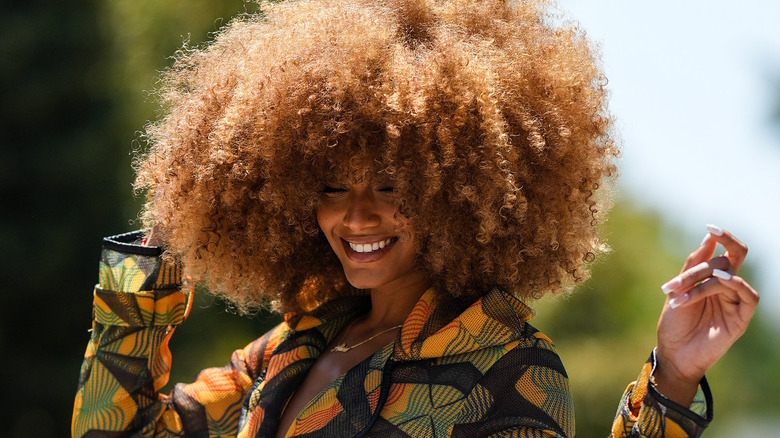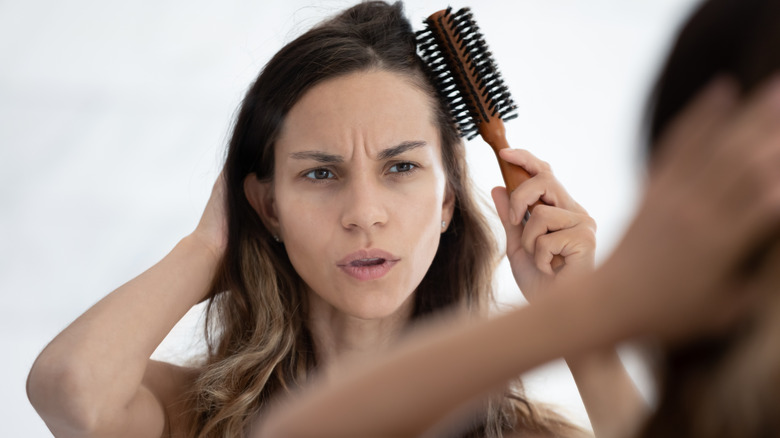The Viral Concept Of 'Scalp Skinification' Can Improve The Health Of Your Hair
In the past, the scalp has not been given a whole lot of attention. Most hair care was targeted toward the actual strands of hair. Co-founder of Mark Ryan Salon Mark Debolt told Byrdie, "For many years hairdressers have taught their clients to shampoo less, pointing to hair powders and dry shampoos to reduce the amount of thermal damage we put upon our hair." Unlike the skin on your face and body, the scalp was generally neglected and ignored. But, this has all changed. The concept of scalp skinification went viral and has now enlightened the masses, bringing us out of the dark ages of hair care.
Hairstylist Michelle Oliver gave a presentation in a segment of City Line in which she said that scalp skinification "referenc[es] the sophisticated formulas and ingredients that we normally find in skincare but being used in haircare." The concept emphasizes that the scalp is skin. Just like the rest of the body, it needs to be protected from getting sunburnt and the reasons you can get acne on your scalp need to be addressed. You might ask, "but why does it matter? Nobody looks at my scalp." Well, by taking care of this scalp, you can improve your hair health. According to the experts, if you have been frustrated with dry, dull-looking hair, learning how to treat your scalp with "skinification" could be the solution.
How your scalp impacts your hair
It's confusing. Many people think that if you avoid washing and treating your scalp, you'll be able to preserve its natural oils and keep the hair hydrated. While this is a logical assumption, it's far from the truth. Sol Santos, technical manager of Tanino Therapy Spain, explained to Cosmopolitan that "the skin on the head becomes saturated, dirty, accumulates sweat, and becomes clogged." However, this is where the hair follicles produce sebum, which is the oil that coats and protects your hair. If you neglect your scalp, and these follicles become blocked as Santos described, the oil cannot properly distribute through to the ends of your hair. The result is dry, brittle locks.
Neglecting your scalp can also cause hair loss and thinning. Adarsh Vijay Mudgil, M.D., board-certified dermatologist told MindBodyGreen "If buildup is really extreme, it can even pull the hair down because there's so much inflammation around the hair follicle." So, if you notice a greasy scalp but dehydrated hair, or you're having trouble with hair loss, you may need to incorporate some scalp skinification into your haircare routine.
How you can begin incorporating 'scalp skinification'
Many chemicals that you would likely associate with skincare will be fantastic for getting your hair and scalp into good health. Board-certified dermatologist Dr. Azadeh Shirazi recommended to Byrdie that people "us[e] a glycolic and salicylic acid spray to prevent or reduce buildup." While these are buzz-worthy ingredients usually advertised for giving your face smooth, bright skin, their exfoliating powers are perfect for breaking down dandruff and dirt derailing your hair health.
Depending on how thick your hair is, it might be challenging to ensure your serums reach the scalp. While a spray may work for some, there are also more thorough methods. TikTok user @mayurijaini shared her process for exfoliating her scalp, coating glycolic acid on the skin. She divided her hair and exposed her scalp. Then, placing a narrow tip applicator directly onto her skin, she layers glycolic acid onto its surface. Then, she "put[s] it in one-inch sections all over my scalp."
Depending on the product you select, you'll want to research the length of time that certified dermatologists recommend it remain on the skin for safe and effective use. Not all "skinification" routines will look the same. Whether you have fine hair, thick hair, a dry scalp, or an oily one, you'll want to ensure the formulas you select target your unique needs and that you know how to use them properly.

